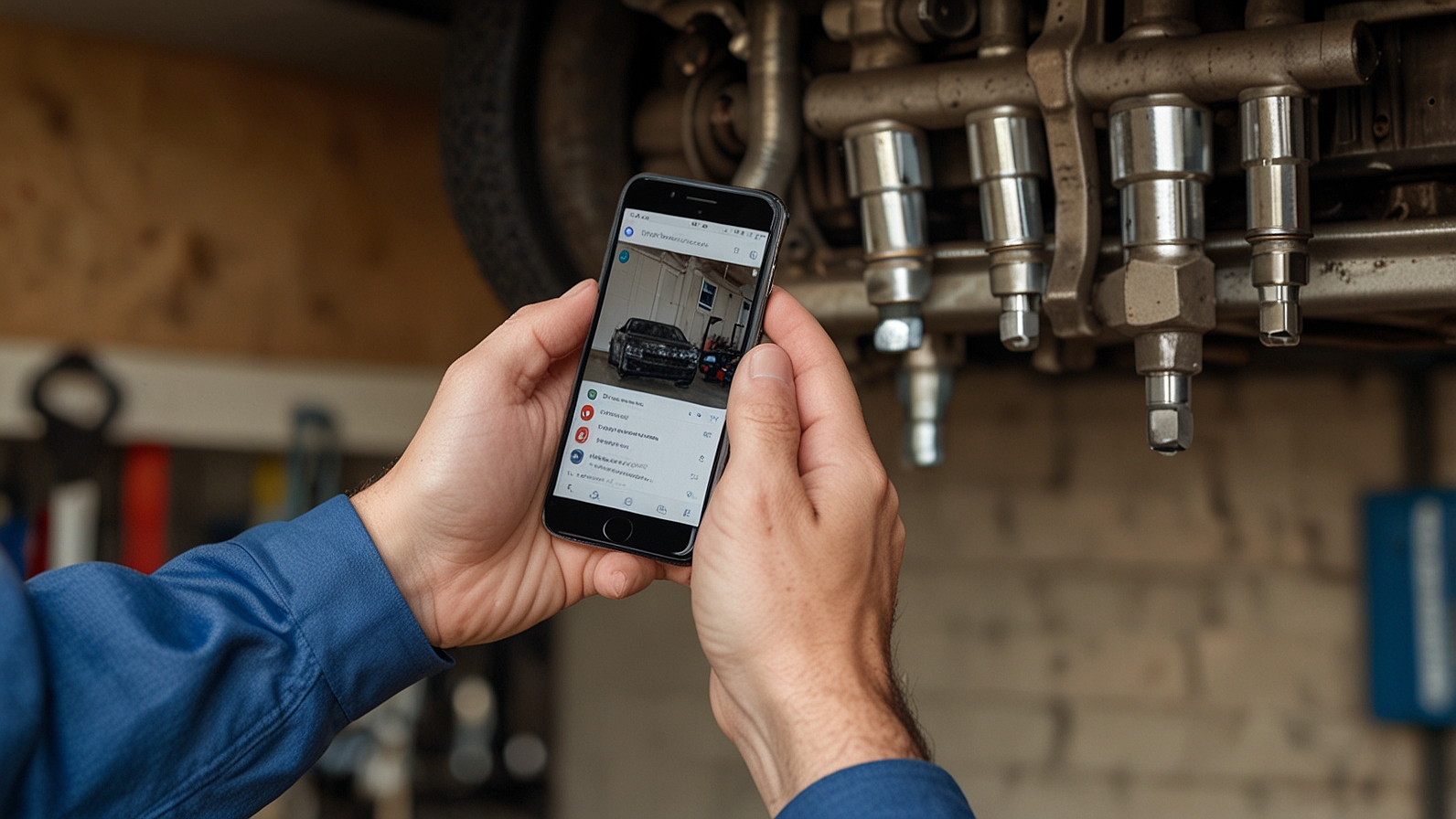Have you ever stood in an auto parts store, completely overwhelmed by a wall of spark plugs, wondering if you’re about to buy the right one for your Saturday project? Or maybe you’re a talented mechanic who can rebuild a transmission blindfolded, but the thought of getting your shop to show up on Google feels like reading a foreign language.
What if you had a single, trusted resource for both? A place where the coffee-stained workshop manual meets the digital playbook.
That’s exactly the driving idea behind enginefirm.com. Think of it as your friendly, well-stocked garage for two types of tune-ups: one for your vehicle, and the other for your automotive business’s online presence. It’s where practical mechanical advice shakes hands with actionable digital strategy.
So, what can you actually find here? The content is built on two main pillars, both designed with a hands-on, do-it-yourself spirit.
- For the Car Enthusiast & DIY Mechanic: This is your go-to library for clear, step-by-step guides. We break down complex engineering concepts into plain English. You’ll find everything from “How to Diagnose a Rough Idle” to “The Best Budget-Friendly Tools for a Home Garage.” It’s all about empowering you to understand and care for your machine with confidence.
- For the Small Auto Shop & Business Owner: This is where we help you tune up your online engine. You’re an expert under the hood; we provide the simple guide to getting found by customers online. We translate confusing SEO and marketing terms into practical steps a busy shop owner can implement, like “How to Get Five-Star Google Reviews” or “Simple Website Tweaks to Attract More Local Customers.”
The beauty of enginefirm.com is that these two worlds aren’t separate. A DIYer running a small detailing side hustle can learn about ceramic coating and then, in the same visit, learn how to create a Facebook page that brings in clients.
Let’s get our hands dirty with some immediate value. You don’t need to be a master technician to extend the life of your car. These three habits are like regular exercise for your engine—they prevent big problems down the road.
- Listen to Your Car (It’s Trying to Tell You Things). Your car communicates through sounds and feelings. A new squeal when you brake? A subtle vibration at highway speeds? Don’t just turn up the radio. Address small noises and quirks early. That $50 repair today can easily become a $500 repair if ignored for months. It’s like a small cough versus full-blown pneumonia; early intervention is key.
- Befriend Your Owner’s Manual & Stick to the Service Schedule. This might sound obvious, but it’s the most overlooked tool in your glove box. Your manufacturer didn’t just make up those oil change and service intervals. They are engineered for optimal performance and longevity. Sticking to this schedule is the single best thing you can do for your engine. Think of it as keeping a regular bedtime and eating your vegetables—it’s simple, boring, but fundamentally vital for health.
- Check Your Fluids (It’s Easier Than You Think). You don’t need to be a mechanic to pop the hood and check your oil dipstick or coolant overflow tank. Do this once a month when the engine is cool. Clean, adequate fluid levels are the lifeblood of your car. It takes five minutes and can save you from catastrophic engine failure. Here’s a quick cheat sheet:
| Fluid | What It Does | Quick Check Tip |
|---|---|---|
| Engine Oil | Lubricates engine parts to reduce friction and heat. | Park on a level spot, pull dipstick, wipe, reinsert, then check level. Oil should be amber-to-brown, not black and gritty. |
| Coolant | Regulates engine temperature. | Check the translucent overflow tank when the engine is cool. The level should be between the “Min” and “Max” lines. |
| Brake Fluid | Transfers force from the brake pedal to the brakes. | The master cylinder reservoir is under the hood. Fluid should be a light, amber color and near the full line. |
Now, let’s shift gears to the other powerful side of enginefirm.com. If you run a small auto shop, tire center, or mobile mechanic service, you might feel invisible online. This is where our guidance comes in.
Think of SEO (Search Engine Optimization) as the hydraulic lift for your business. It’s the tool that raises your visibility so customers can easily find you. You wouldn’t try to lift a car engine by hand, so why struggle to be seen online without the right tools?
Your website and Google Business Profile are your digital garage doors. Keeping them clean, informative, and open for business is crucial. Here’s a simple “Before and After” scenario for a fictional shop, “Mike’s Honest Auto”:
| Before Basic SEO | After Implementing Engine Firm Tips | |
|---|---|---|
| Google My Business | Incomplete profile, no photos, one old review. | Complete profile with hours, services, and 20+ photos of the shop and team. 15 new five-star reviews. |
| Website Content | A single page with a phone number and address. | A website with a blog featuring articles like “5 Signs Your Brakes Need Attention” and “Preparing Your Car for a Wisconsin Winter.” |
| Local Search Results | Doesn’t appear when people search “auto repair near me.” | Ranks on the first page of Google for key local searches, leading to more phone calls and website visits. |
The goal isn’t to become a Silicon Valley tech guru. It’s about doing a few simple things consistently, just like changing your oil. Update your Google listing, ask happy customers for a review, and share a helpful tip on Facebook once a week. Small actions compound into big results.
Whether your passion is turning wrenches in your own garage or building a reputable auto business, the path forward is built on continuous learning. Enginefirm.com exists to be a reliable co-pilot on that journey.
Here are your 5 quick takeaways:
- Prevention is Power: Regular, simple maintenance is far cheaper than major repairs.
- Knowledge is Confidence: Understanding the “why” behind a repair makes any DIY job less intimidating.
- Your Online Presence is Your New Sign: For businesses, being findable online is as important as having a physical location.
- Start Small: You don’t need a huge marketing budget. Focus on claiming and optimizing your free Google Business Profile first.
- Be Helpful: Whether you’re explaining a repair to a customer or writing a blog post, providing genuine value builds trust and reputation.
So, what’s the first project you’re tackling? Are you going to check your fluids this weekend, or finally update your shop’s contact information online? Head over to enginefirm.com and dive into the guides. We’d love to hear about your successes in the comments!
You May Also Read: DOGE Software Licenses Audit Hud: Unused HUD Software Costs Taxpayers Millions
Is enginefirm.com only for experienced mechanics?
Not at all! Our content is designed for everyone, from complete beginners who are just learning to change their own oil to seasoned pros looking for a deeper dive into specific engineering topics.
The marketing advice sounds great, but I have zero budget. Where do I start?
The best first steps are 100% free. Claim your Google Business Profile, ensure your business name, address, and phone number are consistent everywhere online, and start collecting reviews from happy customers. This costs nothing but a little time.
Do you promote specific tool or parts brands?
We may mention brands as real-world examples in our tutorials (e.g., “a quality torque wrench from brands like Tekton or CDI is crucial for this job”), but our primary goal is to provide unbiased education to help you make the best choice for your needs and budget.
How often should I check my tire pressure?
A good rule of thumb is once a month and before any long road trip. Changes in outside temperature can significantly affect tire pressure, which impacts safety, fuel economy, and tire wear.
Can I request a topic for a future article?
Absolutely! We thrive on community input. If you have a burning question about a car problem or a marketing hurdle for your business, feel free to reach out through the contact methods on the website.
Is the SEO advice relevant for other types of small businesses?
While our examples are tailored for the automotive industry (like tire shops or mechanics), the core principles of local SEO, managing online reviews, and creating helpful content are universally effective for any local brick-and-mortar business.
What’s the one most common mistake DIYers make?
Skipping safety. Whether it’s failing to properly jack up a car using jack stands or not disconnecting the battery before electrical work, rushing and ignoring basic safety protocols is the biggest risk. Always put safety first.

